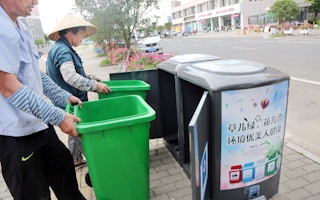Can a cardboard cereal box go into the office paper recycling bin? How about a shiny magazine insert? And which plastics are OK: No. 1, 2, 3, 4, 5, 6 or 7?
It can be a baffling world for those who want to avoid putting all of their waste into the trash can. DIYSigns, a new online repository of ready-to-edit labels and posters that can be used to provide visual cues for proper sorting into multiple bins, aims to help reduce the confusion.
Created by The Recycling Partnership, a Virginia-based nonprofit funded by corporations, trade associations and other entities, DIYSigns is free with an email sign-up. It provides templates to help people understand what kinds of items can be put into different kinds of recycling containers — in the form of curbside labels, office labels, posters, dumpster signs and drop-off signs. Accessing the tool opens a series of folders containing more than 50 designs.
In the U.S., cities typically determine which materials can be recycled, sometimes with input from state governments. DIYSigns enables businesses, communities, schools and others to create a customised visual guide to what can be recycled tailored to their local context.
Visuals help illustrate what kinds of items are allowed to call the recycling bin home. Users can select simple outlines of material types or choose branded icons, such as a Dasani water bottle to represent plastics or a Cheerios box to denote paper and cardboard. The recognisable brands are mostly products made by companies who give money to The Recycling Partnership.
The Recycling Partnership funders include Coca-Cola, General Mills, ExxonMobil, Keurig Dr Pepper, PepsiCo, Target, Amazon, the American Chemistry Council and others. But even as they encourage recycling, some of these companies have faced criticism for profits that depend on environmental damage.
“[W]hile privately fighting against more responsibility, some of these same corporations also tout their million dollar donations to industry funded non-profits including Keep America Beautiful and the Recycling Partnership as proof of their good intentions around recycling,” writes Gina Wu Lee, founder of sustainability advocacy group The Upcyclers Network. “But digging deeper, are these donations a ruse to shift the costs for recycling to consumers and governments and avoid their own culpability?”
While The Recycling Partnership’s DIYSigns aims to help reduce the environmental impact of materials like plastic, funder ExxonMobil is expanding its plastic production. Keurig Dr Pepper is fighting a lawsuit that alleges the beverage company misled consumers by claiming its single-serve “K-Cup” coffee pods are recyclable when, in reality, most recycling facilities can’t isolate the small plastic cups from the rest of the waste stream.
Meanwhile, Amazon has moved toward mailing more products in plastic packaging that can choke up processing facilities when people throw them into recycling bins. Target uses similar packaging, according to The Washington Post.
This dynamic highlights a big question for waste disposal: Does the solution lie in recycling, or should we focus more on not producing waste in the first place?
Whatever the answer, local recycling programmes are struggling to ensure consumers properly sort materials and keep contamination levels down, especially in the wake of China’s decision to sharply restrict waste imports. As some cities curtail their recycling efforts, proper sorting could help improve the situation.
This story was written by Andrew Urevig and published with permission from Ensia.com

















